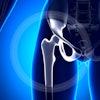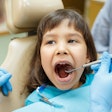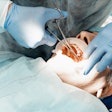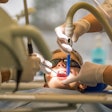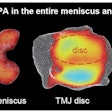
TORONTO - Burning mouth syndrome (BMS) is a painful and chronic condition that frequently causes anxiety, depression, and frustration -- for patients and dentists alike. But progress is being made in both our understanding and treatment of BMS, according to David Mock, D.D.S., Ph.D., in a presentation Thursday at the American Association of Oral and Maxillofacial Surgeons (AAOMS) annual meeting.
The condition is defined as an intraoral burning sensation for which no medical or dental cause can be found. This connotes a long process of excluding all other possible causes before arriving at a definitive diagnosis, said Dr. Mock, dean of dentistry at the University of Toronto.
— David Mock, D.D.S., Ph.D., dean of
dentistry, University of Toronto
BMS can be associated with xerostomia, dysthesia, and/or dysgusia, and patients often experience poor quality of life, depression, anxiety, and somatization. It is also approximately 33 times more common in women than in men and usually appears during or after menopause, said Dr. Mock.
The most common cause of BMS is local irritation by, for example, cigarette smoke. The second-most common cause is candidiasis. Another, sometimes overlooked, cause is vitamin B12 deficiency. This can be most accurately diagnosed by measuring serum methylmalic acid and homocysteine levels, according to Dr. Mock. Furthermore, the clinician must perform a careful physical examination and take illness and medical/dental histories to exclude every other possible diagnosis and hence conclude the patient suffers from BMS.
A paper published earlier this year provides an exciting new concept to explain this syndrome, said Dr. Mock. Alain Woda, D.D.S., and colleagues at the Université d'Auvergne in France hypothesized that a chain of events leading to BMS is initiated at menopause by a drastic drop in the level of gonadal steroids and, in turn, that of neuroactive steroids (Journal of Orofacial Pain, 2009, Vol. 23:3, pp. 202-210). This leads to neurodegenerative alterations of small nerve fibers of the oral mucosa and/or some brain areas involved in oral somatic sensations. The changes then become irreversible and cause the symptoms of BMS.
Behavioral therapy effective
Whatever the cause, once the clinician has arrived at the diagnosis of BMS, the first step in managing it is to eliminate all potential local and systemic factors that may have led to the disorder. This includes smoking and medication, if feasible. It is also of paramount importance to reassure the patient that his or her search for a cause and a cure is over, said Dr. Mock.
"I like to tell the patient, 'No, it's not all in your head,' " he noted. " 'And no, you don't have cancer and you're not going to die.' "
The next step involves treating the symptoms. Anecdotal evidence indicates that both tricyclic amines and selective serotonin reuptake inhibitors help control the pain associated with BMS. However, clinical trial data do not support this approach, said Dr. Mock, and antidepressant use can prompt its own significant side effects, including sleepiness, dizziness, and cardiac concern.
Cognitive behavioral therapy, on the other hand, has been shown in both anecdotal and experimental reports to reduce symptoms, particularly when combined with medication, and Dr. Mock often refers patients to a psychologist for this form of therapy. The primary goal is to teach patients not to focus on their symptoms, he said.
Alpha-lipoic acid can also be effective for reducing BMS symptoms. It is used at a dosage of 300 mg twice a day for three weeks, followed by 300 mg once a day. Clonazepam also shows some promise for BMS, because only low doses are required and it produces a reasonable response. However, it is associated with some side effects and patients may become addicted to it. Therefore, if an initial trial is successful and the patient wishes to continue, he or she should be counseled about the possibility of addiction.
Dan Kaspar, D.D.S., an oral surgeon in private practice in Galesburg, IL, attended the AAOMS session and said he found it "outstanding. ... There was a lot of practical information; for example, I would like to get a psychologist more involved in the treatment of these patients."
Copyright © 2009 DrBicuspid.com



